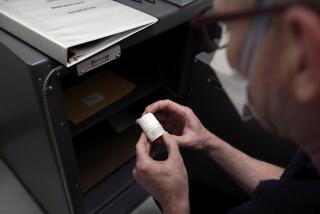Panel Objects to Proposed Study of Breast Cancer Drug : Health: The project would have involved 20,000 U.S. and Soviet women. Backers plan to redesign it and seek approval again.
- Share via
WASHINGTON — A federal advisory panel recommended Friday that the Food and Drug Administration reject a proposal to undertake a ground-breaking U.S.-Soviet study of 20,000 women to determine whether a hormonal drug can prevent breast cancer.
The FDA’s Oncology Drugs Advisory Committee agreed that a long-term study should be conducted to determine the effect of the hormonal drug tamoxifen in preventing breast cancer and other cancers in healthy women.
But the panel said that its members had concluded that the design of the proposed 10-year, $100-million study of women in the United States and the Soviet Union was flawed. The committee said that it would recommend ways to correct the deficiencies.
“I’m disappointed for the women of the country,” said Phillip D. Bretz, director of the Desert Breast Institute in Rancho Mirage and one of the proposed study leaders. “I felt it was time to do it. None of these answers are going to be resolved until this study is done.”
Although the recommendation of an FDA advisory committee is not binding, it typically wields considerable weight in agency decision-making. The FDA must approve the U.S. segment of the study before it can begin.
The committee said there was insufficient information on how the study would be conducted, including recruitment of patients and handling of data. Some members also expressed concern that the volunteers would not be at high enough risk for breast cancer.
Bretz, however, said that the study was rejected because he did not have the academic ties of traditional researchers. He said that he would revise his study proposal in an effort to satisfy the committee’s demands.
The proposed study, endorsed by American and Soviet cancer specialists in March, would involve administration of tamoxifen, an anti-estrogen drug already widely used in post-surgical breast cancer therapy, to women considered at high risk for breast cancer.
It would be the first large-scale study undertaken jointly in the United States and Soviet Union, its sponsors said. The pool of participants, about 10,000 from each country, would consist primarily of daughters, sisters or mothers of women who have had breast cancer and who are considered at high risk of developing the disease themselves. Half of the women would be given a medically worthless placebo for comparison purposes.
The researchers had predicted a 25% reduction in the incidence of breast cancer among the women who were given the drug.
The study would be coordinated by Bretz; Dr. Philip B. Dreisbach, of the Eisenhower Medical Center in Rancho Mirage, and Dr. David Zaridze, deputy director of the All-Union Cancer Research Institute in Moscow.
The study was opposed by some women’s health advocacy groups, who said it is dangerous to experiment with drugs on healthy women.
“This is a drug that is not risk-free,” said Cindy Pearson, program director of the National Women’s Health Network. “It’s a fine drug for a breast cancer patient--a woman facing the possibility of death is more than willing to take a drug that has some risk. But to jump from a drug that’s effective in a group with a life-threatening disease to a huge trial in healthy women is crazy.”
But Dr. Wendy Schain, a psychologist with Memorial Cancer Institute in Long Beach and a former breast cancer patient, recommended approval of the study. “This is the best we’ve got,” she said. “We need to get these answers. We have no better way to get them.”
Tamoxifen causes cancer in animals and has been linked to stroke, heart disease and endometrial cancer in women, according to the FDA. Sponsors of the proposed study, however, maintain that tamoxifen has minimal negative side effects and often reduces cholesterol and eases cardiovascular problems.
FDA officials said that a large study of a drug in healthy humans was “a little unusual,” but not unprecedented. “Any time you do a study on a drug for prophylaxis (prevention), you’re going to use healthy people,” said Dr. Robert Temple, the FDA’s director of new drug evaluation.
Tamoxifen, manufactured by the British firm Imperial Chemical Industries and sold under the brand name Nolvadex, has been used for more than a decade to prevent the recurrence of tumors in women whose cancer had spread to the underarm lymph nodes.
Recently, the FDA approved its use in the post-surgical treatment of early breast cancer in women who do not have node involvement. In this country, it is produced and marketed by ICI Pharmaceuticals of Wilmington, Del.
Tamoxifen works by blocking so-called estrogen receptors--areas on the surface of cells to which the hormone binds to exert its effects. In that way, it blocks the effects of estrogen, which is believed to play a role in the stimulation of tumor growth in breast cancer.
Breast cancer is the most common malignancy among women in the United States and the second leading cause of cancer death among women, after lung cancer. An estimated 150,000 new cases will be diagnosed this year.
More to Read
Sign up for Essential California
The most important California stories and recommendations in your inbox every morning.
You may occasionally receive promotional content from the Los Angeles Times.













